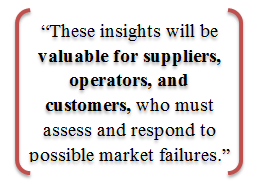Realizing Market Power for Service Value Networks
Editor’s note: we are pleased to welcome Christian Haas of the Karlsruhe Institute of Technology, Steven O. Kimbrough of The Wharton School, and Clemens van Dinther of the Karlsruhe Institute of Technology, who have published a new study on the important area of service value networks, forthcoming in the Journal of Service Research and now available in the journal’s OnlineFirst section.
***
“Strategic Learning by e-Service Suppliers in Service Value Networks” is the product of an international collaboration among service science and computational economics researchers at the Karsruhe Service Research  Institute (KSRI) of the Karlsruhe Institute of Technology and researchers at The Wharton School of the University of Pennsylvania. The study employs leading-edge techniques in machine learning to produce insights into strategic aspects of the operation and managment of Service Value Networks (SVNs). These insights will be valuable for suppliers, operators, and customers, who must assess and respond to possible market failures in SVNs. Further, the methods employed in this study are exemplary for studying other forms of e-Services markets.
Institute (KSRI) of the Karlsruhe Institute of Technology and researchers at The Wharton School of the University of Pennsylvania. The study employs leading-edge techniques in machine learning to produce insights into strategic aspects of the operation and managment of Service Value Networks (SVNs). These insights will be valuable for suppliers, operators, and customers, who must assess and respond to possible market failures in SVNs. Further, the methods employed in this study are exemplary for studying other forms of e-Services markets.
SVNs are an important emerging market institution for providing e-Services. In SVNs, e-Service platform providers assemble final products from components provided by  e-Service suppliers. Normally, product assembly is in real time and in is response to a customer’s expressed requirements. Salesforce (http://www.salesforce.com) is but one well-known and prominent example of an SVN e-Service provider.
e-Service suppliers. Normally, product assembly is in real time and in is response to a customer’s expressed requirements. Salesforce (http://www.salesforce.com) is but one well-known and prominent example of an SVN e-Service provider.
As is the case for any market institution, questions arise and must be addressed regarding the performance and operating characteristics of the market in which SVNs operate. Can there be departures from pure competition? Can market power be realized and if so, how and by whom? These and related institutional operation questions have gained force and urgency since the deregulation of California’s electric power markets and the resulting debacle involving Enron and other firms. As in the case of California’s electric power markets, institutional operation questions  are especially apt during the design and early implementation of a new market institution. Thus, the questions are apt for SVNs. This paper investigates just such questions and provides results concerning institutional operation questions for SVNs.
are especially apt during the design and early implementation of a new market institution. Thus, the questions are apt for SVNs. This paper investigates just such questions and provides results concerning institutional operation questions for SVNs.
Specifically, the paper examines whether and how market power may be achieved by SVN suppliers who may learn to collude tacitly and legally. Two machine learning techniques—genetic algorithms and Probe and Adjust—are made available to supplier agents in an agent-based model of an SVN regime. In both cases we find that tacit collusion among the agents is possible, to the detriment of the SVN’s customers and to the SVN itself. Both learning regimes are simple and rely on readily available information. Thus, it is a robust finding of the study that tacit collusion is a serious risk in SVNs. With knowledge of this possibility, however, managers can hope to diagnose and prevent such collusion when it occurs.
Bios
Christian Haas is a PhD student at the Karlsruhe Institute of Technology,
Germany. He received a Master of Science in Computer Science
from the Georgia Institute of Technology in 2008, and a Diploma in
Business Engineering from the Karlsruhe Institute of Technology in
2010. His research interests include the application of learning methodologies
in strategic contexts, incentive engineering in social networks,
and service science in general. In his PhD, he is currently
working on two-sided market mechanisms and dynamic behavior in
social collaboration systems.
Steven O. Kimbrough is Professor of Operations and Information
Management at the University of Pennsylvania. He also holds a secondary
appointment at, and is active in, the Philosophy Department
at Penn. He works as a decision scientist, with an overarching interest
in rationality and computation. His principal research areas are in procedural
(post-classical) game theory, evolutionary computation, and
applied logic. He also works in the area of text mining and analytics.
He is an inventor on three related patents in this area.
Clemens van Dinther received the venia legendi for Business Administration
from the Karlsruhe Institute of Technology (KIT). He teaches
at KIT and as a guest lecturer at RWTH Aachen. Currently, Clemens is
working at ista Deutschland GmbH as Director for Energy Management
and Business Process Outsourcing. His research interests are
in the application of electronic services, computational economics,
strategic decisions, application of learning methods, Smart Grid, and
Regulation in the Energy Sector.































































































